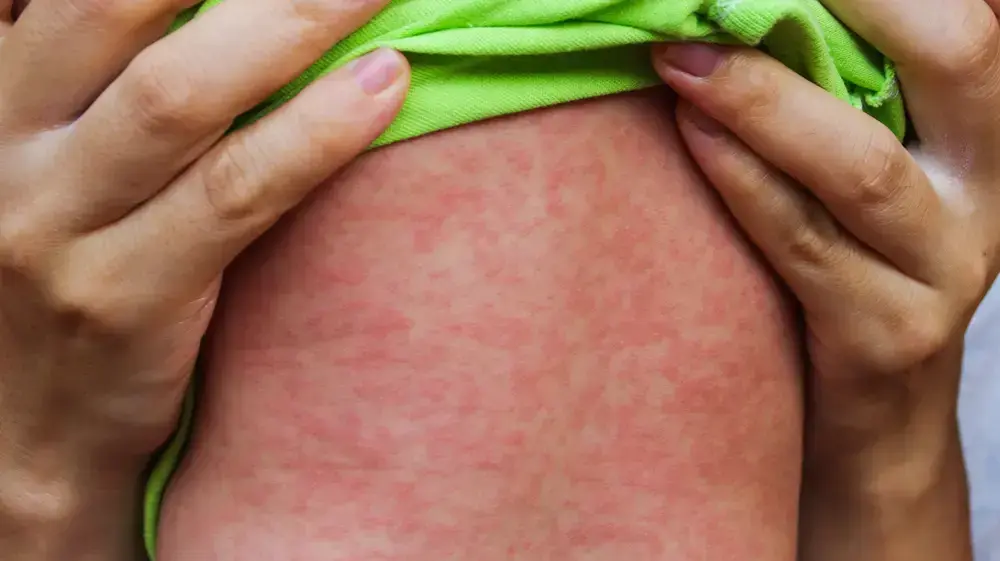A highly contagious disease.
Child with measles/ShutterStock
Recently we have witnessed dozens of cases of different measles infections among unvaccinated people.
Just yesterday (Wednesday) the Ministry of Health informed about two unvaccinated brothers from the Kiryat region who contracted measles.
Since September, two patients have been reported from the Haifa District and six from the Northern District, 10 patients from Tel Aviv, one case from the Netanya area, and another case from the Jerusalem area.
Apparently the two brothers were infected during a stay abroad.
Measles is an easily contagious disease, and in fact anyone who is not vaccinated or has the disease is exposed to it.
Measles caused by a viral infection causes, among other things, a high body temperature, a cough and a rash in the form of red spots with a light center, which spread on the skin and on the mucous membranes of the mouth. A disease with a very high contagiousness. The virus is carried in fragments of saliva droplets splashed from the mouth of a patient who sneezes or coughs. Since it survives in saliva for several hours, the disease can also be contracted through contact with a contaminated surface, long after the patient has left the The place. The risk of infection begins three days before the appearance of the rash and lasts up to five days after its appearance.
Measles is common in children from one to four years of age, but anyone who is not vaccinated against it can get it. The symptoms of the measles disease appear 9-11 days after infection and last until 14 days The disease is particularly contagious after the appearance of the first symptoms and before the appearance of the rash.
The complications of the disease include:
pneumonia
Eye and ear infections
respiratory tract infection (croup)
Measles vaccine
The most effective way to prevent measles is to vaccinate against it.
The vaccine against measles is given to children together with the vaccine against mumps, rubella and chicken pox.
The vaccine is given in two doses: the first dose is given at the age of one year, as part of the 'drop of milk' vaccinations.
Another dose of the vaccine is given as part of the vaccinations given in the first grade at school.
The Ministry of Health recommends vaccinating all children against rubella, measles, mumps and chicken pox with the MMRV vaccine
More in Walla!
KKL-Junk encourages climate studies through scholarships for young students
In collaboration with KKL-Junk
Illustration/ShutterStock
the symptoms of the disease
The symptoms of measles begin to appear 9-11 days after infection and include:
Flu-like symptoms, such as a runny nose, watery eyes, swelling of the eyelids and sneezing
Red and light-sensitive eyes
Fatigue, irritability and a feeling of lack of energy -
Lack of appetite
dry cough
A rash of reddish spots with a light center, appearing 3-4 days after the onset of symptoms, and lasting up to 8 days.
An increase in body temperature that may reach a temperature of 40.6, after a few days the temperature decreases, but may return when the rash appears
Methods of Treatment
There is no specific treatment against measles.
Once the rash has started, the symptoms must be treated until the body's immune system defeats the virus.
Rest and antipyretics are the appropriate treatment in most cases for children with measles, until full recovery.
If no complications have developed, the symptoms will usually go away within 7-10 days.
Advice that will help you in dealing with the disease:
check your child's body temperature, and if it is high try to lower it.
Medicines can be used to reduce fever and relieve pain: Paracetamol or Ibuprofen, for children they can be given in liquid preparations by adjusting the dose in advance for children who are not sensitive to the medicine.
Dimming the lights may help reduce sensitivity to light.
Use a damp cotton pad to clean the membrane around the eyes.
Use a new piece of cotton for each eye and each wipe.
Gently clean the eye from the inside to the outside.
Cough medicines help very little.
However, you should put a bowl of water or a humidifier in the room of a coughing child, which increase the humidity and can ease the cough,
and make sure the child drinks enough.
Hot drinks can help relax the airways.
In addition, small children who have a fever may lose fluids quickly, it is desirable that the child drink as much as possible.
The author: Dr. Amir Amasha, family doctor, Maccabi Health Services North District
More on the same topic:
measles
vaccinations
diseases

